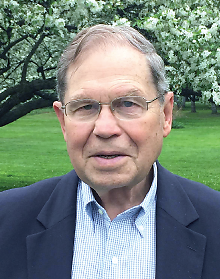Psychoanalysts to Offer ‘Virtual’ Rounds on Psychotherapy for ECPs
Abstract
It is hoped that the program will attract early career psychiatrists in diverse geographical regions, including rural areas, where the need for psychotherapists is great.
Early career psychiatrists (ECPs) seeking additional training in psychotherapy may want to take advantage of a pilot program offered by seasoned psychotherapists and psychoanalysts to provide periodic online training in small-group “virtual” classrooms.
The pilot program, titled “Clinical Enhancement of Psychodynamic Skills: Psychotherapy Virtual Rounds,” was developed by the American College of Psychoanalysts (ACP). It is slated to begin January 2016 and will be free of charge. (The program is supported by a grant from the Laughlin Trust.) The virtual rounds will be held twice a month for an hour and a half; exact days and times will be announced.
Participants need to use a computer with a microphone, camera, and high-speed internet access. Jessica Brown, M.D., a psychoanalyst in Washington, D.C., and Estelle Bender, M.D., of Columbia University, will each meet by videoconference with a group of six to eight ECPs, preferably with a wide geographic distribution. They will present cases and lead a discussion about psychotherapy theory and technique.

Cleveland-based psychoanalyst Norman Clemens, M.D., says early career psychiatrists have received ACGME-mandated training in psychotherapy but may desire more training from seasoned psychotherapists.
Norman Clemens, M.D., a psychoanalyst in Cleveland, a past speaker of the APA Assembly, and current president of the ACP Board of Regents, told Psychiatric News that the idea for the virtual rounds program grew out of the concerns among ACP members that psychotherapy was losing ground among psychiatrists—that the “psyche” was being dropped from psychiatry.
ECPs are a crucial group to reach out to because they may have received training in psychotherapy that is less intense than it once was, said Clemens. “These are psychiatrists who may be doing some psychotherapy but may want to learn more from a really seasoned therapist.”
He also said that the pilot program is hoped to attract participants from a diverse geographic distribution and especially those living and working in rural areas, where there is a shortage of mental health professionals.
In an “Open Letter to Early Career Psychiatrists” published in the Journal of Psychiatric Practice, Clemens urged ECPs to seek out more training in psychotherapy and not let those skills be sacrificed to the demands of a health care marketplace that may make it difficult to practice psychotherapy.
“You were trained in psychotherapy—supportive, psychodynamic, and cognitive-behavioral—to a level of ‘competence’ as required by the Accreditation Council for Graduate Medical Education,” Clemens wrote. “Unless you were in an extraordinary program, you know that competence at the PGY-4 level is not equivalent to proficiency. There is a lot of variability in programs, and few can provide the extent of patient experience that is required to be proficient in even one systematic treatment, such as cognitive-behavioral therapy or psychodynamic psychotherapy, as applied to a wide variety of patients. … There is much to learn in many fields to become a psychiatrist, which constricts the time available in residency for learning psychotherapy. It takes years to become a highly skilled and versatile psychotherapist, just as it takes years to become a mature surgeon.
“I have great respect and admiration for ECPs: your knowledge of psychiatry today is far broader and more current than mine could possibly be,” Clemens concluded. “I write this in the hope that you have caught the spirit of skillful talking with patients wherever you work in the wild world of health care. Then, as a practitioner, an educator, a team leader, or an administrator, your skills will give patients the benefit of full-service psychiatry. I have written this and many other columns in this journal over the years because engaging in psychoanalysis and psychodynamic psychotherapy was the greatest source of challenge and professional satisfaction in my career as a psychiatrist.” ■
To obtain more information or apply to the program, contact Patricia Troy at (410) 647-5002 or [email protected].



